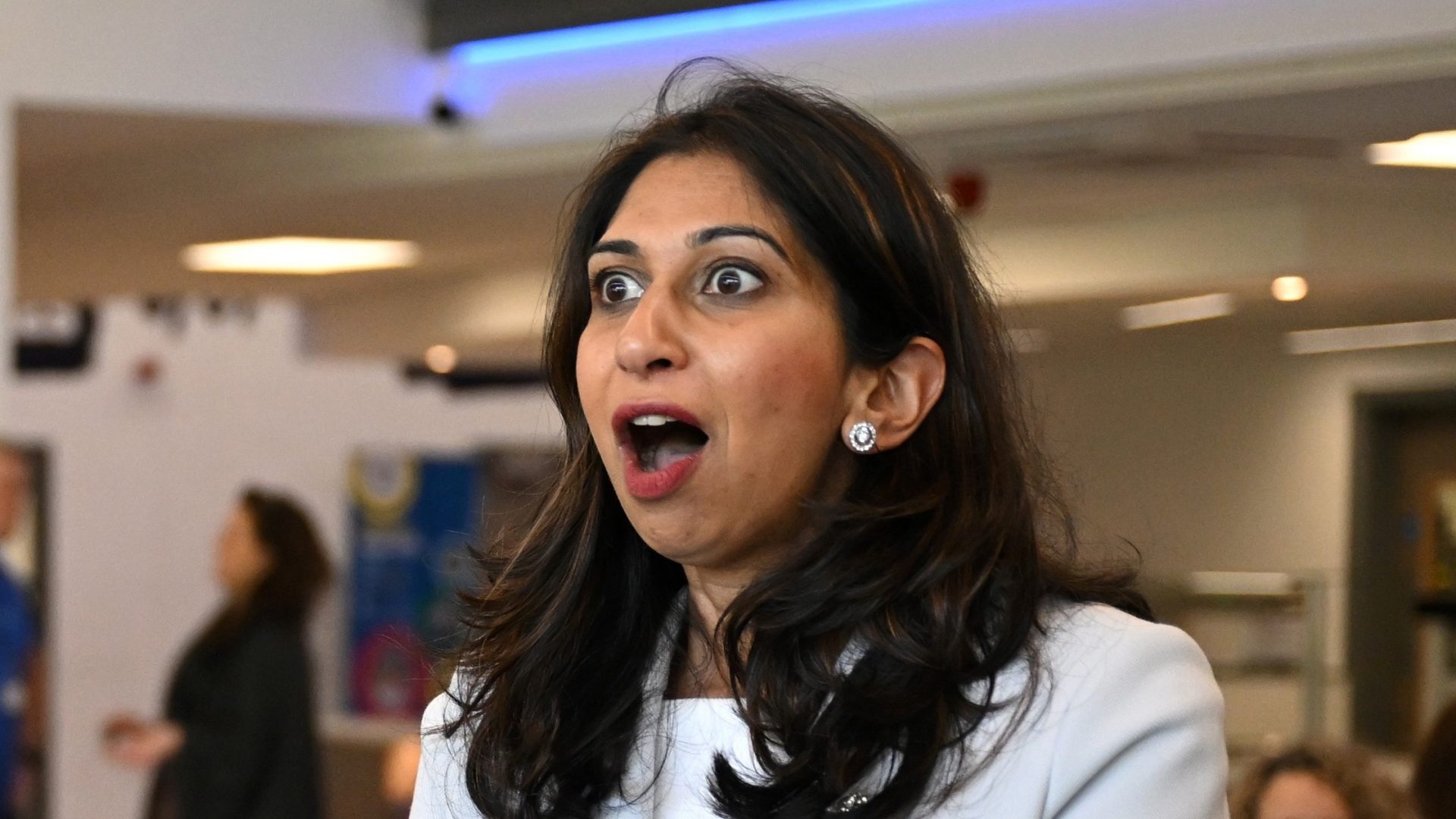Re: “Rubbish: The moral complacency of Rishi Sunak” (TNE #358). Forget the Tory Party. It’s making itself irrelevant. Sunak will lose the next election and will be replaced.
The leadership will again be put in the hands of the party membership, which has long since had any sense distilled out of it. Sunak had to be imposed on them as the ostensibly sensible character in the room (not that he’s made any effort to instil any sense into the party).
If you’re after the support of an unremittingly daft membership to become leader, you have to be the daftest person in the room. Suella Braverman is selling herself as just that.
Trouble is we’ve had Brexit and its failure. We’ve had the farce of Johnson. The xenophobes and homophobes are falling foul of natural attrition, and the youth taking their place have no time for such nonsense.
The electorate has had enough. But not the Tory Party membership, which is hungry for more. So in order to become leader of an already unelectable party she has, ironically, to make it even more unelectable.
That’s the weird state the Tories have got themselves into now. Unless the Tory one-nation advocates can work out how to bring a wrecking ball to the Conservative Party as it stands and reshape the whole thing, it’s screwed.
Peter Marchetto
Rishi Sunak has fired the opening shots in a war on pedestrians and cyclists. Rolling back the end date for new diesel and petrol vehicles and now destroying road-calming and safety schemes, including 20mph zones, is an attack on the safety and health of the general public. Saying he is doing these things for the “hard-pressed motorist” ignores the obvious fact that every motorist is a pedestrian at some point.
According to the RAC, 136,000 people were killed or injured on UK roads last year. On top of that there were 40,000 deaths from human-made air pollution. Various groups and organisations have fought for years to bring those figures down, but our chauffeur-driven, helicoptered PM clearly couldn’t care less, as long as he can cling on to office.
Hugh Janes
Plymouth, Devon
On the subject of the Tories and transport, isn’t it time we renamed HS2 “The Johnson Line”, and give credit where it’s due?
Sadly, a parallel disaster to HS2 is at the decision-making stage right now – East West Rail gives us a great insight into how flawed the process is. Unbelievably, the decision criteria for the selected route explicitly exclude any consideration of cost or environmental impact. The ONLY criteria allowed, when choosing between various route options, is how many houses can be built.
This is why the new track will snake over the hilliest parts of the country, requiring hugely costly bridges and cut-aways, rather than along the wide, flat river valleys of Bedfordshire and Cambridgeshire.
Teresa Moon
Randy Tories
I enjoyed “How the Tories lost their minds” by Andrew Cooper (TNE #358), but Brexit was a consequence of this, not a cause. The cause seems to be an infection of the Tory Party with Ayn Rand libertarianism and isolationist nationalism, a uniquely American recipe that gathered force during the Reagan-Thatcher years.
William Locke
One shocking fact from Andrew Cooper’s article: 70% of people who voted for Brexit still think it was a good idea. How?
Malcolm White
King’s ransom
I see King Charles’s visit to France somewhat differently to Bonnie Greer (“A very European King”, TNE #358). I am an Englishman living in France partly because France is a large and interesting country, but partly because I cannot accept that in these changing times the UK is content to persist with a regime whose constitutional head is there by right of birth.
Charles Windsor and his family live out their lives in a bubble, with obscene levels of wealth and privilege. The UK can never claim to have a true democracy as long as the established order continues to protect such an undeserving dynasty.
I don’t have the T-shirt but I agree with the sentiment that Charles Windsor is ‘Not my King’ and never will be. Vive La France!
J Wells
Like Bonnie Greer, I was impressed by King Charles III’s 20-minute speech in Paris. His references to Charles de Gaulle and to the liberation of France after D-day were poignant.
His reference to a new entente cordiale and more links with European neighbours implied he is very much in favour of the European Union. Indeed, like when his mother opened parliament wearing a blue hat with gold stars, Charles III showed everyone what he thought of Brexit.
David Hogg
Bristol, Avon
State of denial
For years Paul Mason has sought to alert our society, its media and politicians to the accelerating dangers of right wing populism, fascist values and politics. Yet here he is in 2023 (TNE #358) warning that “the political centre needs to stop regarding such movements as quaint aberrations: they are the avowed enemy of the European project and its values, and must be fought”.
Inertia and denial leave the door open to these predatory and well-funded destroyers of lives and democracies; these purveyors of homophobia, misogyny and racism.
How I wish the Labour Party would take the lead in reversing these attacks on democracy, recognising that that means openly and honestly refusing the seductions and corruptions of right wing populism and neoliberal authoritarianism. For all our sakes, before it is too late. Starting now.
Val Walsh
Crosby, Merseyside
Harsh lesson
Abigail King (Carousel, TNE #358) reports that red tape and endless form-filling is putting British students off from studying in Europe. I’m pretty sure this is exactly as the Brexiteers intended.
Vasco Ferr
Bad smell
Coco Chanel (“Phoenix rising”, TNE #358) should not be regarded as a role model. In May 1941, after a long dispute with the Wertheimer family who had set up Parfums Chanel and given her 10% of the shares as a fee, Chanel used their Jewishness and her position as an “Aryan” to ask German officials for sole ownership.
She wrote to the government administrator charged with ruling on the disposition of Jewish financial assets that Parfums Chanel “is still the property of Jews”, adding “The profits that I have received from my creations since the foundation of this business… are disproportionate… you can help to repair in part the prejudices I have suffered in the course of these 17 years.”
Richard Chappell
Slow process
Brexit has indeed turned out to be an act of self-harm (to quote Michael Heseltine.) But for Labour to propose to rejoin now (Gina Miller, TNE #357) would be disastrous.
There is a massive difference between, on the one hand, a clear majority thinking that Brexit was a big mistake and, on the other hand, a campaign promise in 2024 to (seek to) rejoin, which the Tories would depict as yet more years of re-negotiation and wrangling. The Tories’ desperate attempts to stoke culture wars over climate change measures and immigration are failing. But a pledge to rejoin would reopen the argument that the “patronising elite” has still not accepted the referendum result, even seven years on.
In the same edition, Paul Mason makes a powerful economic argument for being in the EU today, as globalisation wanes. But Brexit stemmed at least in part from disquiet at an arrogant EU that over-reached in too many areas. (I guess that Polish, Hungarian and Slovakian farmers are feeling this as I write.) Again, opening up arguments about rejoining now – including whether or not we would have to join the euro et al – could pull disaster from the jaws of triumph for Labour. And would the EU play ball, without knowing for sure that the Tories would not be back soon (prime minister Braverman, anyone?!)?
We need a long period (say, two or three parliaments after the next election) of emerging consensus before rejoining is a live issue. Starmer should do what he can to count us into international economic agreements for now. Any more would be an act of self-harm by Labour.
Calum Paton
Emeritus professor of public policy, Keele University
The EU is a club of democracies: the Brexit vote and all general elections prove that we have a system that does not deliver the will of the people. Until we grow up and invest in a representative democracy – and one that cannot change our membership on the whim of less than 38% of the electorate – I wouldn’t dream of readmitting us.
John Crossman
Sherborne, Dorset
Rounding up
Alastair Campbell’s Diary (TNE #357) made an engaging case for merging good wordsmithery, oracy and oratory and developing the skills of each so that we can all understand each other better and make an impact with what we say. He made a particular point of the need for ministers and shadow ministers to develop these skills.
What is said in the House of Commons is often belligerent, sarcastic, deliberately belittling or downright hostile, and this is aided (indeed encouraged) by the current seating arrangements where governments and opposition sit opposite each other in formal ranks. This invites MPs to play to the gallery and engage in antagonism as a form of entertainment. We all know that Boris Johnson did this; indeed, it was probably his entertainment value that kept him in office.
If we are to encourage children to talk or debate in a civilised way, parliament is far from a good role model. I earnestly hope that when the House of Commons is either relocated or refurbished, the seating arrangements are changed so that they are either in a horseshoe (the Scottish Holyrood model) or even set in a circle.
When some animals known to be confrontational show hostility they hold menacing eye contact before going head-to-head or, to use a phrase which we apply to human animals, too, lock horns. This is very much like boxers squaring up to each other in the media frenzy before a major fight.
Perhaps if MPs were not literally squaring up to each other we could get a proper understanding of the subject being debated, hear arguments and counter-arguments, and find it in our hearts to respect our politicians.
Rosalind Gillan
Huddersfield, West Yorkshire
Guiding light
I read Charlie Connelly’s Great European Lives on Folke Bernadotte (TNE #356) with not just my usual anticipation but added interest in seeing a familiar surname. Even at age 80, I did not expect to see in the photo someone I had seen in the flesh.
In July 1958, a decade after Folke Bernadotte’s assassination, seven British Girl Guides travelled to Burgos in Spain to attend an international camp to celebrate Spanish and Catalonian Guides joining the World Association of Guiding. The Guide leader at the time, who had travelled from Sweden to perform the opening ceremony, was Countess Bernadotte.
Now I have learned so much more about Estelle Manville-Bernadotte and her wonderful husband. She obviously continued his dedication to the “feeling of comradeship” shown by his role in the Red Cross and conflict resolution. She came to Spain, a country still ruled by Franco, who had opposed such organisations. A lasting impression indeed!
Margot Kerr
Inverness, Scotland



